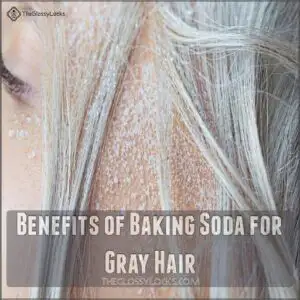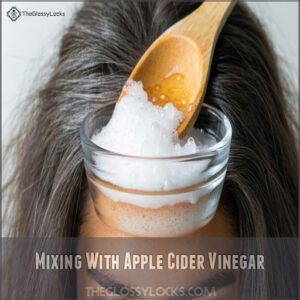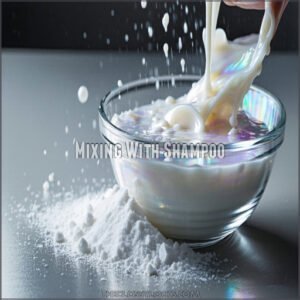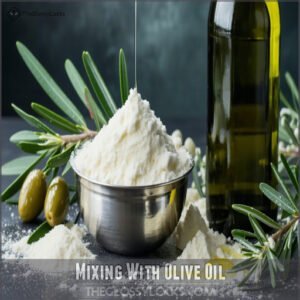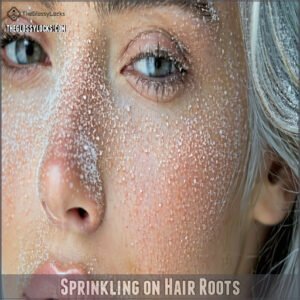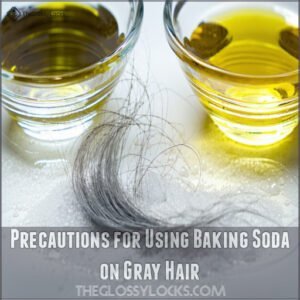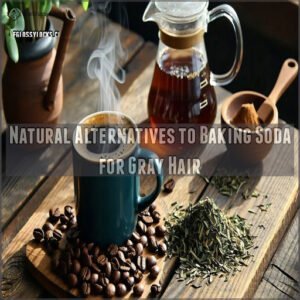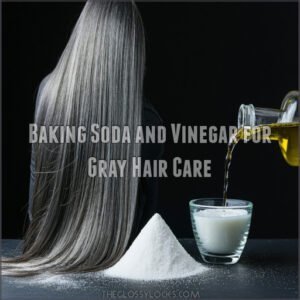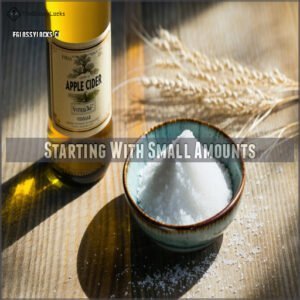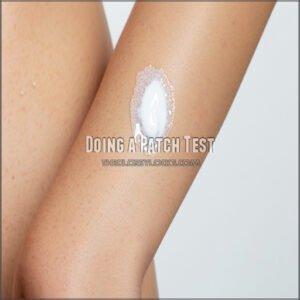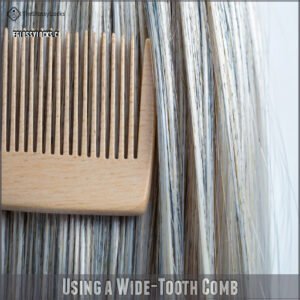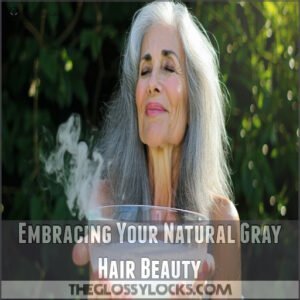This site is supported by our readers. We may earn a commission, at no cost to you, if you purchase through links.
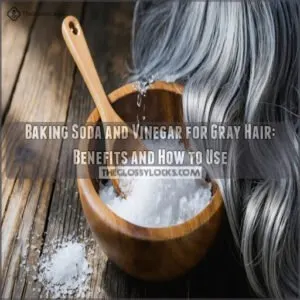 Using baking soda and vinegar for gray hair can help keep your strands clean, shiny, and healthy.
Using baking soda and vinegar for gray hair can help keep your strands clean, shiny, and healthy.
Baking soda works as a natural clarifier, removing buildup from products and oils that dull gray hair. It also exfoliates your scalp, which can improve hair growth and balance pH.
Adding apple cider vinegar as a rinse seals your hair’s cuticles, making it smoother and less prone to yellow tones.
Remember, though, these ingredients are powerful, so dilute them with water, test on a small area first, and don’t overdo it. Used carefully, they’re a handy trick to embrace your natural gray brilliance and achieve smooth hair.
Table Of Contents
- Key Takeaways
- Benefits of Baking Soda for Gray Hair
- Does Baking Soda and Vinegar Work for Gray Hair?
- How to Use Baking Soda for Gray Hair
- Precautions for Using Baking Soda on Gray Hair
- Potential Risks of Using Baking Soda on Hair
- Natural Alternatives to Baking Soda for Gray Hair
- Maintaining Healthy Hair Habits
- Baking Soda and Vinegar for Gray Hair Care
- Tips and Tricks for Using Baking Soda on Gray Hair
- Embracing Your Natural Gray Hair Beauty
- Frequently Asked Questions (FAQs)
- Can one use cider vinegar for hair rinse?
- Can you use baking soda to lighten gray hair?
- Can baking soda cause gray hair?
- Are there natural alternatives to baking soda for gray hair?
- Is vinegar good for gray hair?
- What happens if I put baking soda on my grey hair?
- What do white vinegar and baking soda do to hair?
- What does vinegar do to gray hair?
- Will baking soda and vinegar remove hair color?
- What happens if you put baking soda on grey hair?
- Conclusion
Key Takeaways
- Baking soda clears buildup, removes yellow tones, and brightens gray hair but can dry hair if overused—always dilute and condition after.
- Apple cider vinegar seals hair cuticles, balances scalp pH, and enhances shine, reducing brassiness in gray hair.
- Together, baking soda and vinegar balance pH, clean your scalp, and improve your hair’s natural vibrancy if used sparingly.
- Overusing baking soda and vinegar can strip oils and cause dryness—limit to once a month and always do a patch test first.
Benefits of Baking Soda for Gray Hair
Using baking soda on your gray hair can help remove buildup from products and oils, leaving it cleaner and brighter.
It might also support healthier hair growth by exfoliating your scalp and keeping it balanced.
Clarifying Agent for Hair Buildup
Struggling with stubborn product buildup? Baking soda is your secret weapon for hair purification and scalp exfoliation.
This natural gray clarifier gives your hair renewal by tackling residue effectively.
Try these steps:
- Mix baking soda with water for a clarifying scalp rinse.
- Use a baking soda hair mask for buildup removal.
- Pair with a baking soda vinegar mix.
- Rinse thoroughly for complete hair clarification.
By following these simple steps, you can achieve complete hair renewal with the help of baking soda.
Natural Hair Growth Promoter
Boosting your scalp health with baking soda can do wonders for hair follicles and overall gray hair treatment. Its gentle exfoliation clears buildup, letting your scalp breathe and promoting better circulation.
This paves the way for stronger hair follicles and improved hair texture. For more detailed information, explore this guide on baking soda and vinegar for gray hair.
Plus, by balancing pH, baking soda enhances gray shine and natural volume. Pair this DIY gray hair remedy with a balanced diet and a baking soda vinegar mix for a complete natural hair remedy.
Anti-Fungal and Anti-Bacterial Properties
Keeping your scalp in tip-top shape is easier with baking soda. Its natural ability to tackle fungal control and bacterial balance makes it a fantastic choice for gray hair care.
Think of it as an extra layer of hair hygiene, gently managing microbes while enhancing scalp health.
Pair it with vinegar for even better results. Together, they offer a natural gray hair remedy that boosts your routine and scalp defense.
- Helps manage bacteria and fungi with ease
- Promotes cleaner, fresher scalp health
- Combines with vinegar for enhanced hair hygiene
Does Baking Soda and Vinegar Work for Gray Hair?
You’ve probably heard of using baking soda and vinegar for gray hair care, but does it actually work? The answer lies in their unique abilities.
Baking soda acts as a clarifier, removing buildup and reducing yellow tones from gray hair, giving it a cleaner, brighter look. For further insights, explore this guide on baking soda and gray hair.
On the other hand, vinegar, especially apple cider vinegar, is like the balancing act your hair craves—it seals cuticles, boosts shine, and improves scalp health. Together, they’re a simple, natural gray hair remedy.
| Here’s how these work: | Ingredient | Benefits | Effect on Gray Hair |
|---|---|---|---|
| Baking Soda | Clarifies buildup | Enhances color, reduces yellowing | |
| Apple Cider Vinegar | Closes cuticles, adds shine | Boosts softness and texture | |
| Combined Use | pH-balancing duo | Improves overall hair porosity |
Before trying this combination, do a patch test—your natural gray hair should glow
How to Use Baking Soda for Gray Hair
If you’re curious about using baking soda for your gray hair, it’s all about mixing and applying it the right way.
From combining it with vinegar to blending it into shampoo, these simple methods can help keep your hair looking its best while avoiding damage.
Mixing With Apple Cider Vinegar
Mixing baking soda with apple cider vinegar (ACV) creates a powerful combo for gray hair care.
Some products address apple cider vinegar gray hair.
Here’s a simple process:
- Mix 1 tablespoon each of baking soda and ACV with water.
- Apply the mixture to your hair evenly, focusing on the scalp.
- Leave it for 10 minutes, then rinse thoroughly.
It balances scalp pH, clarifies hair, and neutralizes gray tones.
Mixing With Shampoo
Giving your shampoo a boost with baking soda can make gray hair pop while keeping your scalp in check.
You can find specialized baking soda shampoo products designed for gray hair. Just mix a teaspoon with your regular shampoo for some occasional love.
It’s all about balance here!
- Shampoo Ratio: 1 teaspoon baking soda to a palmful of shampoo.
- Benefits: Hair Clarify, Scalp Exfoliate.
- Frequency: Monthly use works best.
- Gray Enhance: Adds volume, brightens silver tones.
Mixing With Olive Oil
For a nourishing boost, try adding olive oil to baking soda for a DIY hair mask.
Known for its Olive Oil Benefits, this mix combats dryness while enhancing Gray Hair Shine.
You can find more information on olive oil hair mask products.
Use an Olive Mix Ratio of 1 tablespoon oil to 1 teaspoon baking soda, massage for Scalp Nourishment, and rinse thoroughly.
It’s natural hair care with baking soda benefits hair.
Sprinkling on Hair Roots
Sprinkling baking soda on your roots can refresh your scalp and uplift dull hair. Gently massage it into the roots for better blood flow and healthier hair follicles.
Rinse away impurities with cold water for a cleaner, lighter feel.
- Boosts scalp health while exfoliating dead skin.
- Encourages gray restoration, adding shine to gray strands.
- Supports root care by improving volume and reducing buildup.
Precautions for Using Baking Soda on Gray Hair
You’ve got to be careful when using baking soda on gray hair, as its high pH can strip natural oils and cause dryness.
Always dilute it with water, focus on your scalp, and follow up with a good conditioner to keep your hair healthy.
Diluting With Water
Diluting baking soda with water is the first step to safely care for gray hair while protecting its natural shine and strength.
The right water ratio maintains pH balance and avoids dryness. Start with 1 teaspoon of baking soda mixed with 3 parts lukewarm water for effective mixing.
This delivers gentle cleansing without over-stripping oils. Use it monthly for safe dilution and to brighten gray hair naturally.
To avoid damage, don’t overdo it—washing hair with vinegar as a follow-up rinse can help restore softness. Remember, baking soda for gray hair works best when diluted correctly and sparingly, keeping your hair healthy!
Focusing on The Scalp
When using baking soda for gray hair, focus on your scalp—it’s the root of healthy hair.
A gentle scalp massage during application works wonders:
- Boosts circulation to your hair follicles.
- Improves scalp health by removing buildup.
- Balances scalp pH for better growth.
Think of it as self-care for your scalp.
Healthy gray hair starts with a refreshed, cared-for scalp.
Following With Conditioner
After a baking soda gray hair treatment or vinegar hair rinse, grab a conditioner.
It’s like giving your hair a hug—it seals cuticles and locks in moisture.
Pick a conditioner with hydrating ingredients for Hair Repair and Scalp Balance.
Your Aftercare Routine matters, so use it sparingly but consistently.
Happy, soft strands need thoughtful Moisturizing Tips, not overdoing it!
Avoiding Overuse
Gray hair thrives on balance, so overusing baking soda can upset your scalp’s pH and cause dryness.
For further information, explore these baking soda benefits and risks.
Stick to safe limits by using it sparingly—around once a month is best. Watch for irritation or signs of damage.
- Moderate use avoids stripping oils.
- Consider periodic breaks to maintain gentle application.
- For damage control, always follow with vinegar to lock in hydration.
Potential Risks of Using Baking Soda on Hair
Using baking soda on your hair might seem like a quick fix, but it can lead to dryness and even damage over time.
Its high pH can upset your hair’s natural balance, leaving it brittle and lacking shine if you’re not careful.
Dryness and Damage
Too much baking soda for gray hair can leave you with brittle locks, a dry scalp, and even split ends.
It strips away natural oils, making your hair feel like straw and harder to style.
To avoid hair breakage and frizzy texture, balance this with a good conditioner and moisture-rich treatments.
Ask yourself, does baking soda damage hair?
Use it sparingly—it’s about moderation, not excess, in your hair care routine.
Over-Neutralization of Hair PH
If your hair feels dry and brittle, overusing baking soda might be the culprit.
Its high pH levels can throw off your hair’s pH balance, leading to alkaline effects like weakened cuticles and hair damage. Baking soda can improve gray hair’s shine, but overuse can cause dryness.
To protect scalp health, follow up with vinegar. Here’s how:
- Mix vinegar with water.
- Rinse gently.
- Enjoy restored pH balance!
Using vinegar is a method to counteract the effects of baking soda, and by doing so, you can also improve gray hair’s shine.
Natural Alternatives to Baking Soda for Gray Hair
If you’re looking for gentle, natural ways to care for your gray hair, there are great options beyond baking soda.
Ingredients like tea, henna, and coffee can enhance your hair’s tone and keep it healthy without the risk of dryness.
Tea for Natural Dye
If you’re looking for a gentle way to enhance your natural gray hair, herbal infusions like tea can work wonders.
Black tea and sage tea are great DIY recipes that act as dye alternatives, subtly darkening gray tones while preserving natural hair care.
Simply brew a strong tea, let it cool, and rinse it through your hair.
These natural tones develop gradually, leaving a soft Tea Stain effect.
It’s a simple, effective way to avoid chemicals, pairing beautifully with baking soda and vinegar routines for brighter, healthier hair.
Henna for Hair Coverage
If tea didn’t give you the depth you wanted, henna might.
This plant-based hair dye offers natural tones while doubling as a conditioner.
For gray coverage, mix henna into a smooth paste, apply like a mud mask, and let it sit.
- Deep red shades.
- Nourishes hair.
- Safe alternative to chemicals.
- Color enhancement naturally.
- Blends grays beautifully.
Coffee for Natural Dye
Coffee offers a simple, natural way to enhance gray hair with a darker tone. It’s like a gentle wake-up call for your strands!
- Brew a strong coffee and let it cool.
- Rinse your hair with it, ensuring even coverage.
- Repeat weekly to deepen color gradually.
- Follow up with conditioner for smoothness.
This minimalist gray hair solution is a caffeine boost for your locks!
Maintaining Healthy Hair Habits
You can keep your gray hair healthy by sticking to simple habits, like eating a balanced diet and giving your hair regular trims.
Avoid overdoing heat styling, since it can make your hair brittle and lose its shine.
Balanced Diet for Hair Growth
Feeding your hair from within starts with nutrient-rich foods. Grab eggs, nuts, and leafy greens—they’re packed with vitamins and minerals that fight nutritional deficiencies and premature graying.
For stubborn hair, healthy oils like avocado and fish oil can help.
Here’s a quick guide:
| Nutrient | Source | Benefit | Tip |
|---|---|---|---|
| Protein | Eggs, lean meats | Strengthens hair | Include in breakfast |
| Omega-3s | Fish, chia seeds | Adds shine | Weekly fish meals |
| Vitamin E | Nuts, seeds | Repairs damage | Snack on almonds |
| Iron | Spinach, lentils | Supports melanin | Pair with Vitamin C |
Regular Trims for Hair Health
When did you last schedule a trim?
Snipping 1/4 to 1/2 inch off your hair prevents split ends and keeps strands healthy. Think of it as pruning a plant—it encourages stronger growth.
Regular trims, paired with scalp massages and natural remedies like baking soda and vinegar, are key for gray hair care. They protect against surprise breakage and maintain your hair looks fresh.
Add trims to your routine, just like your favorite hair growth tips. Your grays will stay stunning!
Limiting Heat Styling
Protect your hair by skipping excessive use of hot tools.
Instead, explore gentle styling with rollers or braids, keeping thermal limits in mind.
When you must use heat, apply a heat protection spray to shield against hair damage.
Pairing baking soda for gray hair treatment with a vinegar wash for grey hair helps restore vibrancy while avoiding the stress of constant styling tools.
Baking Soda and Vinegar for Gray Hair Care
You can use baking soda and vinegar to help clean your gray hair and remove yellow tones.
Together, they exfoliate the scalp, balance pH, and leave your hair feeling fresh, but it’s important to use them carefully to avoid dryness.
Removing Yellow Tones
Tired of yellow tones dulling your gray hair?
Baking soda and vinegar team up to save the day! Baking soda’s cleansing powers help remove buildup, while vinegar balances pH, enhancing shine.
Mix one teaspoon of baking soda with a cup of water, apply, then rinse with diluted vinegar.
This combo brightens gray hair, restores vibrancy, and even works on beards.
Exfoliating The Scalp
Caring for scalp health doesn’t need fancy products. Baking soda for gray hair works as a gentle exfoliant, and vinegar benefits hair by balancing scalp pH.
This natural scalp treatment boosts circulation while unblocking hair follicles.
- Mix 1 tbsp baking soda with 2 tbsp vinegar.
- Massage onto your scalp.
- Rinse thoroughly.
- Follow with conditioner.
Using baking soda in this manner can be an effective and natural way to care for your scalp.
Tips and Tricks for Using Baking Soda on Gray Hair
When using baking soda on gray hair, start with small amounts and always do a patch test to check for any sensitivity.
Use a wide-tooth comb to spread the mixture evenly, making the process easier and gentler on your hair.
Starting With Small Amounts
Start with initial dosing when trying baking soda for gray hair. Use a small batch—just a pinch mixed with water or your shampoo.
Gray hair can be delicate, so gentle application is key. This keeps any surprises at bay while allowing your hair to adjust.
Baking soda brightens gray and neutralizes yellow tones, but minimal exposure is best to avoid dryness. Gradually increase usage after seeing how your hair responds.
Think of it like testing a new recipe—low-risk and easy to tweak. Pair with vinegar benefits for hair to enhance shine and balance pH.
Doing a Patch Test
Before trying baking soda and vinegar on your gray hair, it’s smart to check for any unwanted skin reaction.
Do an allergy check with a quick patch test:
- Pick a Spot: Use your inner arm for testing.
- Apply the Mix: Combine baking soda, vinegar, and a bit of water.
- Wait 24 Hours: Watch for redness, itching, or irritation.
Protect your pH balance!
Using a Wide-Tooth Comb
When using a baking soda gray hair treatment, don’t overlook a wide-tooth comb. It’s your go-to for gentle combing that untangles knots without breaking delicate strands or ruining your natural texture.
For gray hair, consider managing frizz effectively. For extra care, a soft brush designed for wet and dry hair gently massages the scalp, boosting circulation and supporting healthier roots.
Want the vinegar baking soda hair wash benefits to shine? Combing techniques matter! Simplify detangling by starting at the ends, working upward. Keep tangles away and enjoy smoother, brighter locks—goodbye, yellowing!
Embracing Your Natural Gray Hair Beauty
Over time, embracing natural gray hair becomes more than just a style—it’s celebrating your unique beauty.
Your silver locks symbolize wisdom and confidence, redefining aging gracefully.
Proper grey hair care enhances color, neutralizing brassiness and boosting shine.
Find a look that enhances your hair texture and personal style, whether it’s a chic bob or layered cut.
Explore options like baking soda gray hair treatment or vinegar for gray hair to maintain vibrancy and loving your natural beauty is empowering; with proper gray hair care, your silver locks can shine as a mark of elegance and self-acceptance.
Frequently Asked Questions (FAQs)
Can one use cider vinegar for hair rinse?
Yes, you can use cider vinegar as a hair rinse.
It tightens cuticles, balances scalp pH, and boosts shine.
Just dilute it with water to avoid irritation, and rinse thoroughly afterward.
Can you use baking soda to lighten gray hair?
About 60% of gray-haired folks notice yellowing over time.
Baking soda, diluted with water, can help lighten hair and remove buildup, but don’t overdo it—its high pH can leave your hair dry and brittle.
Can baking soda cause gray hair?
Baking soda doesn’t directly cause gray hair, but it can dry and damage hair, which might make gray strands appear more noticeable.
Genetics and aging are the main reasons behind graying, not baking soda.
Are there natural alternatives to baking soda for gray hair?
Ever wonder about safer options?
Try coconut oil for nourishment or apple cider vinegar for shine.
Kaolin clay gently cleanses, while Fuller’s Earth clarifies without damage.
These natural alternatives keep your gray hair healthy and vibrant!
Is vinegar good for gray hair?
Vinegar can be great for gray hair.
Its acidic nature tightens hair cuticles, adding shine and reducing yellow tones.
Just dilute it with water to avoid dryness, and always follow up with a good conditioner to ensure the best results with vinegar.
What happens if I put baking soda on my grey hair?
Think of it as a double-edged sword—baking soda can lift yellow tones and clarify gray hair.
But overuse might dry it out, make it brittle, or strip natural oils.
Always dilute it and condition afterward.
What do white vinegar and baking soda do to hair?
When you mix baking soda and white vinegar for hair, they balance pH, break down buildup, and remove impurities.
However, overuse can dry your scalp, so use sparingly and always follow with conditioner.
What does vinegar do to gray hair?
Imagine your gray hair as a vintage photograph—vinegar helps preserve its beauty.
It smooths cuticles, locks in moisture, enhances shine, and neutralizes yellow tones, giving your hair that fresh, vibrant look every time, with vinegar being the key to achieving this.
Will baking soda and vinegar remove hair color?
Baking soda and vinegar can fade hair color, especially semi-permanent or temporary dyes.
Baking soda’s alkalinity and vinegar’s acidity strip pigments over time, but don’t expect a complete color removal.
Use sparingly to avoid damage.
What happens if you put baking soda on grey hair?
Gray hair is like a delicate silver thread.
Baking soda can remove buildup, brighten yellow tones, and add volume, but overuse dries hair, causing brittleness.
Use sparingly, dilute, and always condition after.
Conclusion
Did you know gray hair makes up about 18-22% of all hair by volume in people over 50.
Using baking soda and vinegar for gray hair can help maintain its shine and health by removing buildup and balancing your scalp’s pH.
Just be cautious—overusing these can cause dryness.
Always dilute, patch test first, and don’t skip conditioning after.
With care, these natural ingredients can help you embrace your gray brilliance while keeping your hair clean and smooth.
- https://cosmeticworld.ca/blogs/articles/what-does-baking-soda-do-to-gray-hair
- https://sparklingsilvers.com/the-only-baking-soda-recipe-you-need-for-grey-hair/
- https://www.womansworld.com/beauty/hair/brighten-gray-hair
- https://quicksilverhair.com/naturally-brighten-gray-hair-and-keep-it-that-way/
- https://oconto.extension.wisc.edu/files/2011/02/Baking-Soda.pdf

